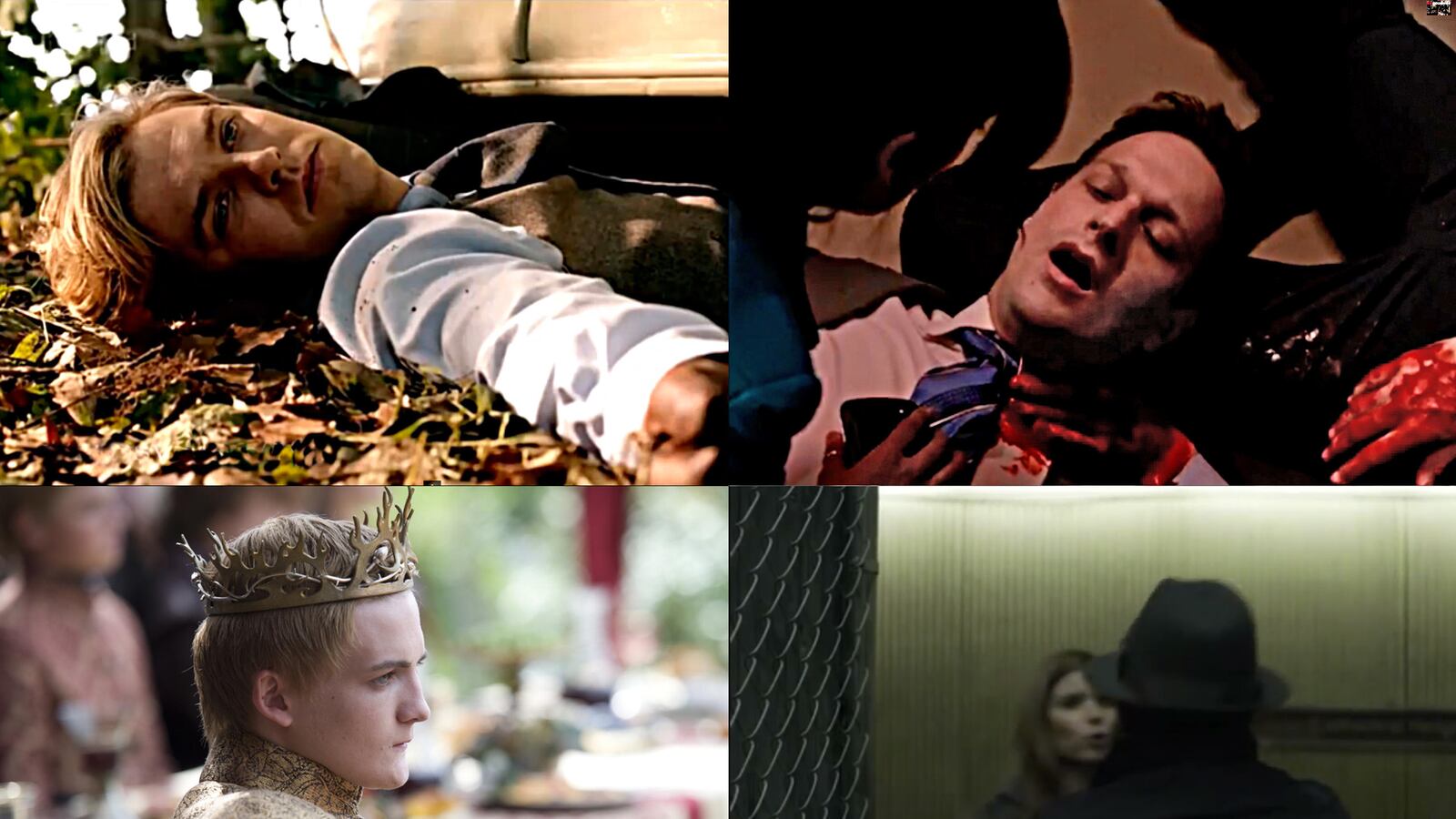When I watched last night’s Game of Thrones a few weeks ago on an advance screener DVD from HBO, the episode bore a subtitle that said, “Incomplete VFX.” Most of the time this just means that there might be a little digital pruning to be done on background images, but, as that disclaimer hovered over the late King Joffrey’s snotty face, I hoped that the producers planned on adding a little CGI flourish to this particular assassination. Never has an audience wished for a television character’s death more than for that of the flamboyantly cruel, homicidally bratty, lipless villain Joffrey Baratheon, first of his name. And the least HBO could do is let us see his eyeballs shoot out of his head or something to mark the occasion.

Joffrey is by no means the first major casualty of Game of Thrones, a series that is justifiably notorious for dropping everyone from anonymous prostitutes to presumptive protagonists with gleeful abandon. And while this fatal wedding reception is certain to make The Knot’s list of the year’s most violent nuptials, it still pales in comparison to the “Red Wedding” that ended season three by dispatching a majority of the members of House Stark. In the wake of that massacre, this feels like an aftershock, a spin-off, Red Wedding: King’s Landing Edition.
What’s surprising is not that Game of Thrones offed a major character, but rather how commonplace just such a move has become recently. Just a little over three weeks ago, seemingly out of left field, The Good Wife killed off Will Gardner (Josh Charles), one of the show’s leads; a few days earlier, a crucial secondary character was executed on Scandal; a few weeks before that, House of Cards began its second season by throwing Zoe Barnes (Kate Mara), a character central enough to have been included on advertising posters for the season, in front of a subway train; and Season 4 of The Walking Dead has consisted almost entirely of the deaths of regular cast members. This convention was even parodied last fall when Family Guy killed off Brian the Dog, only to bring him back a couple episodes later. And viewers are so used to it that Brody’s dramatic death on Homeland this winter was decried as too little too late by fans who had demanded his head for two seasons already.
The surprise death has been around on television for a long time—The Shield and The Sopranos were recent pioneers, and as long as soap operas have been in production or television actors have wanted to trade up to movies, main characters have been killed, resurrected, and killed again—but it’s hard not to feel as if we’re in the middle of a renaissance of dramatic house-cleaning. This trend is not so interesting because of its frequency, though, as it is for what it tells us about the way writers and showrunners are approaching the business of long-form narrative television at the moment. While the loss of a major character obviously places a limit on narrative—one less character, one less narrative arc, one less set of possible combinations—these shows have become uncommonly invested in the possibilities opened up by an abrupt exit.
Not every death emerges from the brain of the showrunner-auteur, however. Season 3 of Downton Abbey, for instance, came to a close as both Lady Sybil (Jessica Brown Findlay) and Matthew Crawley (Dan Stevens) met gruesome, untimely ends. As viewers, we’ve come to put a great deal of stock in the wisdom and long-term planning of showrunners, but Julian Fellowes didn’t kill his characters in order to further his narrative goals. He did it because his actors wanted to leave the show. Dealing with this bloodletting, it turned out, was not something the show could handle, and, as a result, the deaths of Sybil and Matthew were not just catastrophic for the family; they led to the worst reviews in the show’s history. The death of a major character doesn’t just create a hole to be filled. It changes the structure of a show, and adaptive writers must realize that a series can’t just go back to telling the same old stories with different faces.
The Good Wife, this season, has faced a similar challenge but seems prepared to roll with the punches. According to various reports, Josh Charles told creators Robert and Michelle King that he wanted to leave the show at the end of last season. (Presumably to pursue a long career of regretting that he left a lead role on the best show on network television.) The Kings, conscious of the traumatic re-adjustment that might follow the exit of such a central figure, convinced him to stay through to the end of the fifth season.
And it’s already becoming clear how the show has begun to transition past Will Gardner. A few episodes into this season last fall, the show girded itself by introducing a pre-emptive catastrophe: Alicia Florrick’s break with the firm. That move felt like an end in itself at the time, but it now feels more like table setting. The Good Wife introduced its potentially fatal fatality into a world already in flux. Will’s death couldn’t irreparably shatter an already shattered world. When the dust finally settles, all of the pieces will be re-arranged, and the show can move on intentionally and with new purpose.
Then there’s Joffrey. The instability that comes along with a major character’s death is only a virtue if writers can manage a controlled detonation. In that case, David Benioff, D.B. Weiss, and the other writers who have been adapting George R.R. Martin’s Song of Ice and Fire for the past three years are television’s most accomplished demolitions experts. Since Ned Stark lost his noodle at the end of the first season, Game of Thrones’ narrative momentum has been generated not so much from the positive actions of characters—taking cities, winning battles, etc.—than from the echoing effects of terrible losses like Ned’s death, Renly’s death, or even the shocking mass death at Blackwater Bay.
As I’ve argued recently, Game of Thrones is a show that revels in de-centering its narrative perspective, focusing on marginal characters, putting the lie to the very idea of the protagonist in fiction or history. But it also gets a lot of energy from watching those marginal characters wildly surf on the waves created by the deaths of the show’s ostensible protagonists. Death is not a solution to an external problem for Game of Thrones; it’s the catalyst for the whole series.
So Joffrey’s death is not necessarily about the pinching off of one narrative vein as much is it is about allowing that blood to flow into other reaches of this universe. One of the most effective things about the first season of Game of Thrones was that, while the series was clothed in the garb of The Lord of the Rings, its plot was fairly straightforwardly that of hard-boiled crime fiction. Ned Stark came to King’s Landing to help his old friend rule, but what he primarily did to occupy his time was investigate the death of his predecessor Jon Arryn, hang out in the city’s seedy underbelly, and get beat up a lot. Arryn’s death is the one that sets this plot into motion, and the uncovering of the mystery surrounding it was the uncovering of the premise of the show.
This mystery element has been largely absent from the show since Ned was taken care of by the new King Joffrey. Now, the whole of Westeros is abuzz about the secret killer. Was it the scheming femme fatale? The jealous imp? The ruthless patriarch? The vengeful wedding guest? The great deaths so far have come as surprises, but they’ve made sense in retrospect. We didn’t necessarily see the Red Wedding coming, but we can look back and clearly perceive the ways in which it had been set up from the first season. And while many things remain unknown in a mystical sense—Bran’s powers, the Fire God, Arya’s Braavosi friend—we haven’t had a stone-cold whodunit since before Arya and Sansa were orphans.
Bringing the show back to some version of its Westerosi noir origins is just one of the ways in which Joffrey’s death will certainly allow Game of Thrones to transform again. And because nobody will really miss Joffrey—except inasmuch as we will miss the almost supernatural way the young actor Jack Gleeson has given his character life—it also gives us an opportunity to think, from a critical distance, about just what characters are in the grand scheme of contemporary serial television. They are our way into a story, but they are ultimately just a part of that story.
If a series is telling a story that matters to us, the loss of a main character can be jarring but generative. Now that Will Gardner is gone, I’m no less fascinated by the tale of gender, power, and law that The Good Wife has yet to spin. Similarly, while the Red Wedding upended my sense of that show’s narrative geography, it didn’t upend my sense of that show’s identity or preoccupations. The best dramatic shows aren’t only able to withstand loss—they’re built to allow for it, to dramatize it in meaningful ways. It’s a cliché now to say that, on shows like Game of Thrones, “no one is safe.” But, in today’s television landscape, it’s safety that is the real killer.






